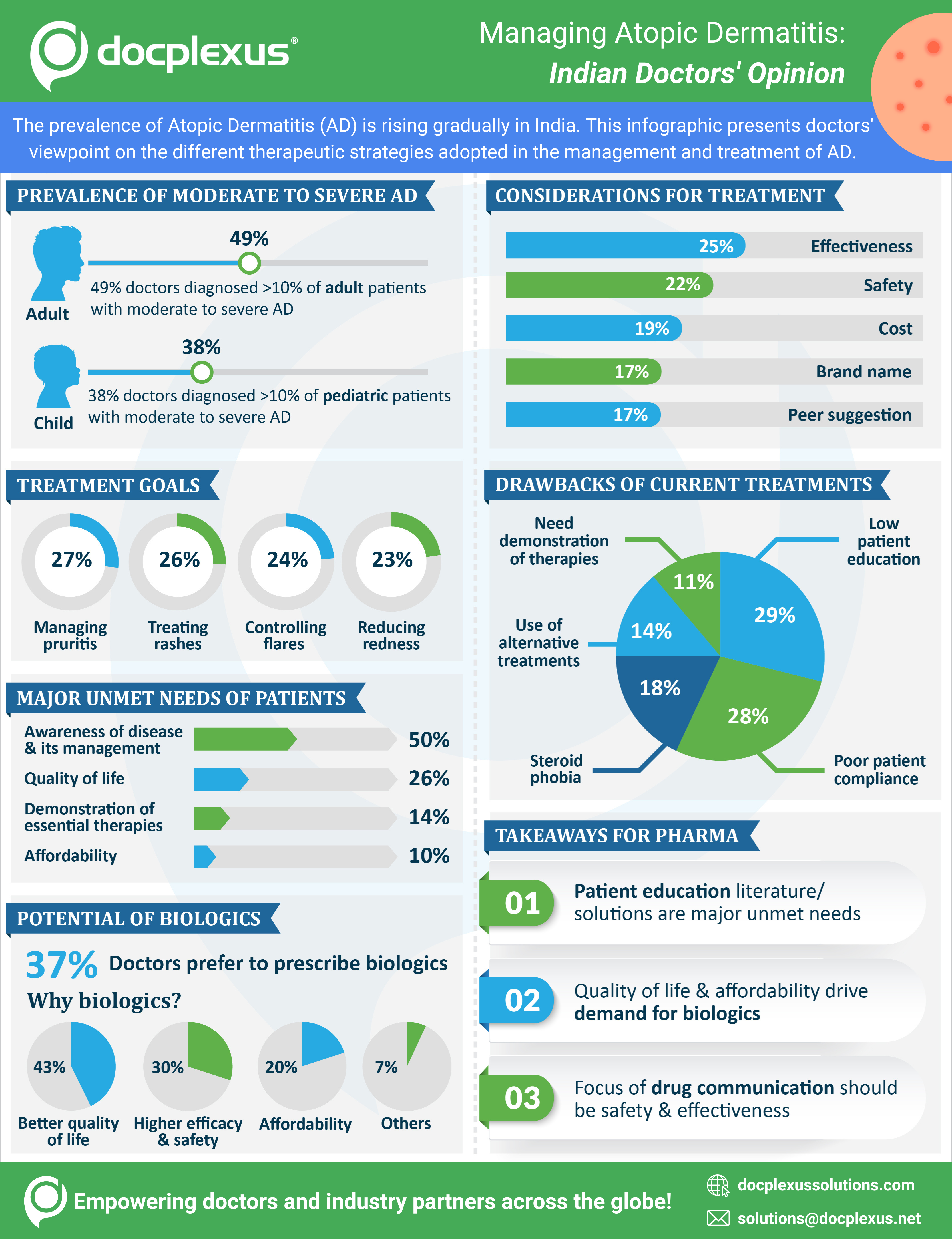
Atopic Dermatitis (AD) a chronic inflammatory skin disease poses a significant burden on healthcare resources and patients’ quality of life. Globally, it affects about 20% of children and 3% of adults. Currently, anti-inflammatory agents, antihistamines, and antibiotics are available for the management of this chronic condition. However, there is still a gap between current Pharma offerings and the expectation of the medical community concerning the management of this disease. Pharma through various value-added services can create ample touchpoints and gain strong followership amongst their current and future prescribers.
To get more insights into what the doctors need for the effective management of AD, we surveyed our community members.
Survey Details:
Aim: To understand Doctors’ Viewpoints on the Management of Atopic Dermatitis
Methodology: A nationwide online poll on Docplexus
Respondents: 1,022 Dermatologists, Pediatricians, GPs, and Consulting Physicians.
Survey Results:

Analysis:
Rise in Moderate to Severe Cases
AD can be classified based on the different signs and symptoms. Generally, mild atopic dermatitis affects a small area of skin and maybe itchy sometimes. Moderate to severe atopic dermatitis covers larger areas of skin and is itchy, wherein sometimes the itch may be intense.
According to a study by Werfel T et al., the incidence of AD varies between 11% to 21% based on age. A recent study published in JAMA Dermatology suggested that 54.6% of the total adult atopic dermatitis cases were between moderate to severe levels.
According to our survey findings, 49% doctors opined that more than 10% of their adult patients suffered from moderate to severe atopic dermatitis, whereas 38% doctors mentioned that they diagnosed more than 10% pediatric patients with moderate to severe atopic dermatitis. The high rate of moderate to severe cases of atopic dermatitis has led to a more advanced and intense treatment approach for the management of AD.
Efficacy and Safety of Treatment are of Utmost Importance
Effective management of AD is required to ensure timely disease control and prevent further spread of the disease. According to our survey, efficacy (25%) and safety(22%) of treatment were of the highest importance to doctors for management of atopic dermatitis followed by cost (19%), brand of medication (17%), and peer recommendations (17%). This suggests that doctors follow the evidence-based medical practices and update themselves with the latest clinical trials and patient case reports when they prescribe any medication for the management of AD.
Considering that this is an important parameter for decision making of doctors, Pharma communications with respect to AD management should be more focused on clinical trial details and patient case reports that illustrate the efficacy and safety of the medication.
Treatment Goals based on Patient Issues
Typically, AD can flareup and cause pruritis, rashes, itch as well as redness. As seen from the survey, the treatment goals of the doctors were nearly similar for all the above-mentioned conditions. Based on the suggestions received from the community, it can be considered that the treatment strategy should be based on the management of the prime patient complaints to ensure a better quality of life for the patient.
Current Treatment Drawbacks and Patient Needs
Our survey findings suggest that although the current management approach for AD may be effective in disease management, it requires demonstration of the use of the medication. In addition, general concerns about the use of steroids and its side effects have caused the patients to opt for alternative medicines. As the patients are not well aware of their treatment plan and the need for the medications, once they feel little better, their compliance level goes down, which ultimately impacts patient recovery and quality of life. We believe that Pharma can leverage these current gaps in the management of atopic dermatitis to create a better doctor-patient relationship and more touchpoints for them to leverage upon.
Why Biologics?
Biologics are defined as drug products that are produced from or contain components of living organisms like recombinant proteins, tissues, genes, allergens, cells, blood components, etc. Biologics are being explored and have shown great potential in the niche space of management of AD due to their promise to manage the disease in a safe and effective manner as they target pathogenic molecules.
Our survey findings also demonstrated a similar opinion by the doctor community. 37% Doctors have mentioned that they consider biologics for management of their patients with AD due to their advantages like higher efficacy and safety, a better quality of life for the patient and the affordability of the medication.
Key Takeaways for Pharma:
High prevalence of chronic AD in the pediatric and adult population, and the current gaps in terms of management of this condition, can be leveraged by Pharma to make their mark in this therapy area.
Below are a few key points that Pharma can consider for establishing leadership in the AD market:
1) Patient Education Kit as Value Addition:
Medical professionals feel that patient education is of utmost importance to ensure compliance and proper disease management. In this respect, patient education material is sought after by the doctors. If pharma marketers can address this unmet need of prescribers, it will help them differentiate themselves from competitors and strengthen their relationship with customers.
2) Adding Biologics to AD Portfolio:
Since biologics improve the quality of life while maintaining good efficacy and safety of the medication, they are gaining wide acceptance among prescribers. In 2017, Dupilumab became the 1st biologic to gain US FDA’s approval in treating moderate to severe AD. In coming years, Biologics are expected to gain traction in the AD market owing to their ability to treat the disease effectively while maintaining safety and affordability.
3) Communicating Efficacy and Safety:
While prescribing medication to chronic AD patients, the physicians focus on the efficacy and safety of the medicine. Considering this aspect, Pharma’s marketing communication with the medical professionals should be based on explaining the effectiveness and toxicity aspects of the medicine and how it is going to ensure a better quality of life for the patient.
Docplexus is one of the world’s largest & fastest-growing networks of verified doctors & a trusted marketing partner of pharma, medical devices, diagnostics & nutraceutical companies. We empower our industry partners to meaningfully engage with the medical community through data-driven, evidence-based marketing & brand management solutions such as infocenter (branded microsite), mindset analysis, KOL webinars, sponsored medical updates, online CMEs & more.
